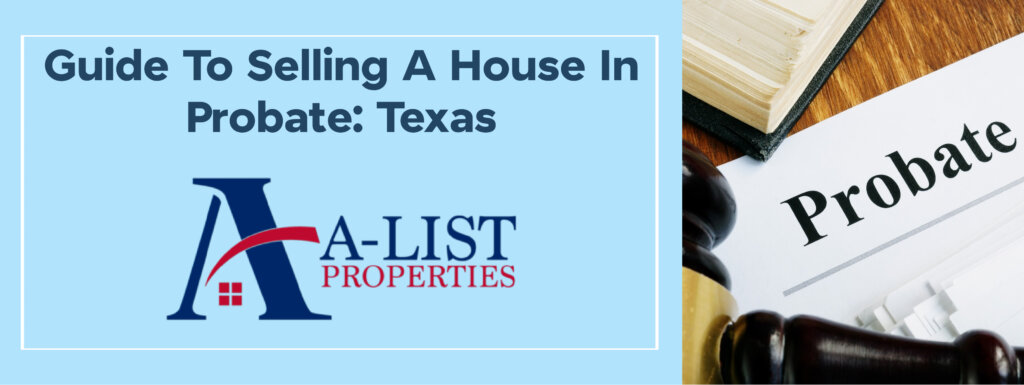
Selling a House in Probate Texas Guide
When your loved one has recently passed, you likely don’t want to think about their will and property. It is challenging to figure out how to manage their last wishes regarding inheritance and administer their will, especially when you are grieving.
The process can become even more difficult when you sell the decedent’s house or other property in Texas during probate. It’s often necessary and adds a few more steps to the process. If you’ve been wondering “how to sell my house in probate,” you’re in the right place. We’ll go over everything you need to know to help you weigh out your options and give you some tips to make the process smoother.
Table Of Contents
Probate Sale Meaning
When a person passes away, their property and assets may go into probate if they didn’t leave a will (also known as an intestate estate), if their will is complex or if their will is unclear about how things will be distributed. Probate is a legal process that involves assessing and validating the terms of the deceased’s will or figuring out how to distribute the inheritance to the rightful people.
The executor is the person named in the will who is in charge of administering the will and acts as a representative for the family. They must be 18 years of age and usually have a connection to the family. If there is no will, the court will name an administrator. While personal assets and property are in probate, the court ensures that the deceased did not have outstanding debts before the assets are distributed to beneficiaries.
In many cases, the deceased still has considerable debt that hasn’t been paid off. The executor and court may determine that a sale of the Texas House in probate is needed to satisfy any outstanding debts. The remaining money will then be distributed to the beneficiaries.
Probate sales work differently than conventional real estate sales as they involve the court. The process can take longer as the proceeding has to go through the court system. There are also rules about how the house can be priced. Buyers won’t have as much wiggle room with negotiations.
Probate Process for Selling Real Estate in Texas
Texas requires the seller to go through specific steps when selling real estate in probate. Failure to follow these steps can make the process take even longer or halt it altogether, especially if someone acted in bad faith. As long as everything is pretty straightforward, the probate process is usually completed in about six months. However, if the will is contested or missing, it can take upwards of a year.
A Uniform Probate Code was designed to make the probate process more straightforward. While Texas hasn’t adopted the code, it does follow many of the same proceedings.
To speed up the probate process, ensure everything is well organized. Follows these steps to ensure things go smoothly.
File Probate With the Local Court
If the deceased didn’t leave a will or if there are some disparities in the will, the executor must start by filing a probate request/petition with the county court where the deceased (also called the decedent) lived. The executor has four years to file probate.
As executor, you’ll need to gather several documents when filing probate, including a death certificate and a will. You’ll have to provide more documents throughout the process, such as a list of assets, proof of paid debts, insurance claims, etc.
You’ll submit the will and fill out a probate petition at the local court clerk or through a probate court if your county has one. The court will then open probate.
The Court Appoints an Executor
If the decedent named an executor in their will, that person will usually serve as executor during the probate process. The executor may be a surviving spouse or child of the decedent. Sometimes, the deceased may have appointed a trusted friend or advisor or hired an attorney. The executor is in charge of administrating the will during the probate process.
If there is no will or the deceased didn’t appoint an executor, the court will appoint an administrator to act as an executor. The Texas probate court will usually choose one of the inheritors, like the deceased’s spouse, child, or sibling. Anyone who would like to be the executor can petition the court.
The executor is responsible for creating a list of the decedent’s assets, finding and paying off any debts or outstanding taxes, and seeing that all property and assets are distributed to the beneficiaries.
Sell the Probate Real Estate Texas
When the Texas inheritance includes real estate properties, the family must decide what to do with these properties. Sometimes, the properties are left to the beneficiaries, but in some cases, no beneficiary is named. The inheritors may choose to sell the house in probate.
There are a few reasons to sell the house in probate. First, if none of the beneficiaries want to live in the house, it’s often easier to sell and split the money. If the deceased had outstanding debts and didn’t leave behind enough money to pay them off, the executor may decide to sell the house in probate to pay off the debts.
If you decide to sell a probate house, you’ll first need to file a probate application for sale with the courts. You need the court’s permission before you can list the house.
Next, you need to have the house appraised. With a conventional real estate sale, you have some wiggle room when pricing a house. With a house in probate, Texas probate law requires that the house sells for at least 90% of the appraisal value.
The seller or an agent will list the house for sale and market it, much like a regular house is listed and marketed. Interested buyers will make an offer, which must be at least 90% of the appraised price. They must also put down a 10% deposit.
The seller (executor) will decide if they accept or reject the offer. If both parties agree to the terms of the offer, then it’s brought before the court. The court will specify a day for the finalization of the sale.
After the court has mailed a Notice of Proposed Action to all heirs, the heirs will have 15 days to dispute the sale. Before the sale can be finalized, there will be a court hearing. The judge will open bidding in the courtroom. Anyone present can bid on the house, but their bid must be 5% over the original offer plus $500. People can continue in this process, known as overbidding. The original buyers will be reimbursed for their 10% down payment if someone has the highest bid.
The new buyer will pay the executor 10% of the new cost. They’ll sign a contract with no contingencies, and the house will go into escrow. It will usually close within 15 days.
When Can the Executor Sell the Probate Property In Texas?
It’s not a good idea to sell the house before probate. The executor should file with the probate court before listing any property or doing anything else with the decedent’s assets. The court must verify the will and either approve or appoint the executor. Once everything is validated, the executor is free to proceed with selling any property.
If the decedent had any outstanding debts to creditors, especially if it’s a lot of debt, then the executor will likely need to submit an offer on the house to the court for approval before accepting the offer.
Can You Sell a House Before Probate Is Complete In Texas?
You can sell a house during the probate process in Texas if you file an application and ensure that everything has court approval. You’ll be required to follow the probate process to the letter, otherwise, the sale may take much longer than necessary or may not go through at all.
Once the sale is finalized, the executor won’t receive any profits. Instead, the funds go into a probate escrow account. Once outstanding dates have been paid and probate is finalized, the money will be dispersed as stated in the will.
Do You Need to Go Through Probate to Sell an Inherited House in Texas?
In almost all cases, probate laws in Texas will require you to go through probate before selling a house you inherited unless you can request informal probate (usually when the will is simple). Probate courts require wills or properties to be validated before anything is sold or distributed. Probate protects the deceased’s final wishes, the beneficiaries, and any debtors owed money from the deceased. Probate ensures that everyone involved gets what they’re supposed to.
Probate House Sale Issues In Texas
It’s important to note that if you want to sell your probate house, you may run into some issues. The process differs from a conventional real estate sale, with a few more hoops to jump through. You also have to be careful to diligently follow the process, or you could cause problems.
While some buyers are fine with purchasing a probate house, others are reluctant. Probate homes are often sold as-is so buyers may have concerns about the house’s condition. The seller can’t allow for contingencies, so buyers can’t make an offer before they’ve secured a loan. The buyer may also be reluctant because probate sales take longer, and someone may overbid them in the courthouse, making them lose out on the property.
Disclosures work differently with a house in probate as well. In most cases, the executor hasn’t been living in the house and can’t properly disclose it. You just need to be sure you’re following the laws regarding disclosures. Buyers can come back with lawsuits if they feel you purposely misrepresent the house.
Finally, since the probate process can take time, you will be responsible for the house’s upkeep. You should keep up the probate house with some basic landscaping and utilities. However, maintenance can be costly if the probate process takes longer than expected. The process can be much longer if there is a dispute about the sale or if a beneficiary contests it. The insurance company may cancel coverage if the house is empty for over 60 days.

“A friend referred us after my mother-in-law had passed away and we needed to sell her house quickly. We met at the house and he was completely transparent and honest about what his offer would be. I felt completely at ease working with Zach. He even offered to help us rehome my MIL’s dogs if we couldn’t find new homes for them. I would definitely use him again!”
Debra M.
Options You Can Consider When Selling a House in Probate
If you decide to sell your house in probate, you can consider a few options. Each option has positive and negative factors, so consider everything carefully before deciding.
Listing Texas Property With a Real Estate Agent
Agents familiar with probate law in Texas can be helpful when selling your probate house. You can find a Texas agent with a Certified Probate Real Estate Specialist (CPRES) license. These real agents are the best at helping individuals or families sell probate properties.
Your agent will list the house, market it, and supervise any showings. They will help you through the entire process.
Pros and Cons
The pros of hiring an agent include having a knowledgeable person to supervise your probate sale in Texas. You won’t have to worry about details like listing and marketing the property. If you decide to make any repairs, an agent usually has a network of contractors who may discount their services.
Hiring an agent means you’ll have to pay a commission of 6%, cutting into your profits. If you can’t find an agent knowledgeable in probate sales, you may have trouble finding an agent willing to take on your property. They may also insist that you make the house more marketable by making repairs and updates.
Selling the Property to a Family Member
Sometimes a family member may wish to buy the property. If multiple beneficiaries split the profits from the sale, one beneficiary may offer to buy everyone out. Or, they may be a relative who isn’t a beneficiary but wants to buy the house. They’ll still be required to pay at least 90% of the appraisal value.
Pros and Cons
Selling the house to a relative means that the property will stay within the family, which is important if the house has sentimental value. A family member may know the house well and be aware of any issues that need repairs. You’ll also avoid having to go through an agent, waiting for a buyer, and paying a commission.
Doing any sort of business with family can be challenging. The family member may expect more from you, simply because you’re related. If things don’t go as planned, then you could wind up in a family dispute
Selling The Texas Probate House As-Is to a Cash Home Buyer
You also have the option of selling the house as-is for cash. For this process, you’ll contact a cash home buyer. They’ll give you an offer on the house, and you can decide whether you want to sell or not.
Pros and Cons
One of the biggest pros to selling with a cash home buyer in Texas is that you are guaranteed a sale. You don’t have to worry about buyers backing out or their loans falling through. You can sell the probate house as-is, so you don’t have to sink any money into repairs. Probate house buyers will often buy the house even if you haven’t moved everything out. The process is also typically quicker than going through an agent.
If the house is in good order or is worth a lot of money, you may feel you can make more money by going with an agent.
Texas Probate House Sale Frequently Asked Questions
Selling a probate house in Texas can be confusing. The more you know about the process, the easier it will be. Below are some of the most frequently asked questions about selling a house in probate in Texas.
Can an executor sell the property to themself?
An executor can sell the property to themself, but there are few technicalities to navigate. First, the executor can’t do anything until all documentation has been filed and probate is processed. They also can’t do anything without the permission of the court and the other beneficiaries.
Once the house is in probate, the executor can purchase the house and must follow the same procedures as anyone else. They’ll be required to pay at least 90% of the house valuation price and must pay the downpayment. They’ll also need the approval of the court and any other beneficiaries.
Can you live in a house during probate?
If you lived in the house before the person died, such as if it’s your spousal or family house, you can probably keep living in it during the probate process. It can be helpful to continue living there so that you can maintain the house and pay the mortgage to keep the house from going into foreclosure.
Things are a little murkier if you didn’t previously live in the house. You’ll need permission from the court and the executor if you aren’t the executor yourself. It will often depend on the plans for the house. If the house is to be sold, you’ll likely not be allowed to move in, as it can hold up the selling process.
Can you empty a house before probate?
You can’t do anything in Texas before the house is in probate, including emptying out the contents. It can be frustrating, as you and the other beneficiaries may want to go through things and separate items you want to keep, but you have to wait until the house is in probate and the court permits you.
Once the house is in probate, the items inside the house will either be distributed amongst the heirs or it will be sold through an estate sale. If you plan to sell the house in probate, you’ll need to clear out the house before putting it on the market after probate.
How long does it take to sell a house in probate?
Typically, the court will be required to approve every step of the probate process, including the sale of any property. As a result, it can take a long time to sell a house in probate in Texas.
You could be looking at six months or more if you sell the property to an individual. If any heirs contest the sale, it can complicate matters further and make the selling process take much longer.
Do all heirs have to agree to sell the property?
In Texas, all heirs must agree to the sale of any property. A probate sale is relatively easy when everyone agrees to the sale and then splits the profits. However, one or more heirs have a different idea of what should be done with the property.
If an heir refuses the sale, the case can get tied up in probate court. Sometimes, things can be settled through a transaction where the heir’s title is bought out so the sale can go through. Otherwise, the court will decide what should happen with the property. The case can be held up for quite some time whenever there’s a dispute.
Easiest Way to Sell a House in Probate Texas
The passing of a loved one is difficult enough without worrying about the probate process getting complicated. If you’d rather keep things simple and quick, your best bet is a cash sale probate.
When you sell the house as-is to a cash buyer, you don’t have to worry about upkeep, repairs, or other responsibilities and expenses. You don’t have to go through listing the house or paying commission to real estate agents. You don’t have to worry about buyers backing out.
A cash sale service like A-List Properties in Dallas, TX, can make the probate selling process as hassle-free as possible. We will buy the probate house as-is and help to move things along as quickly as possible. You won’t even have to move your relative’s belongings.

“It was such a pleasure working with Zach and his team. They were very professional and informative during the entire process. Everything went smoothly and the purchase of my property was fast. I would definitely recommend this company and I will use them in the future.”
Jamila J.
More Questions?
If you have any additional questions about selling a Texas house in probate, A-List Properties is here to help. Contact us today with questions or if you’re ready to get a quote for your probate house.
Get a Free Online Quote From a Cash Home Buyer in Texas
This will be a Cash transaction with no agents, commissions or fees associated. All the proceeds will be left for YOU to enjoy! Let us help TODAY!
These findings apply to all cities in Texas, including Dallas, Fort Worth, Austin, San Antonio, Houston, El Paso, and more. If you need any help or have questions about inherited property in the state of Texas, give us a call. We are always happy to help.


